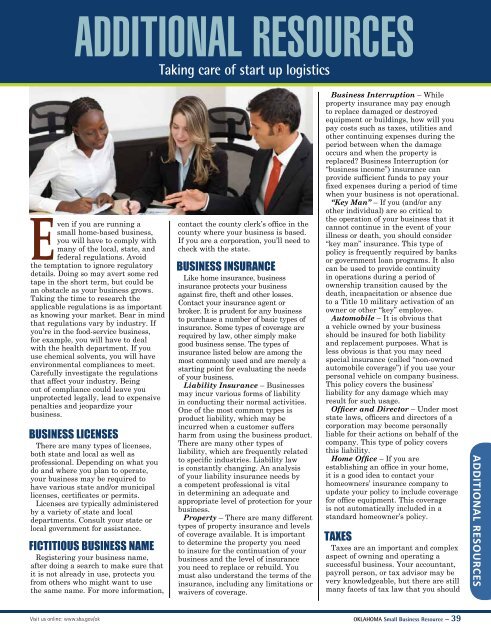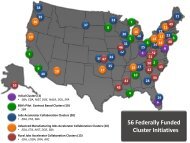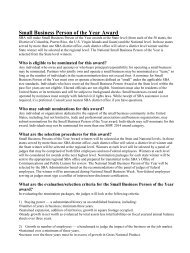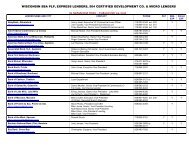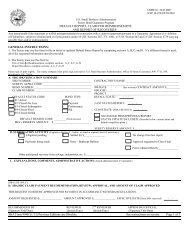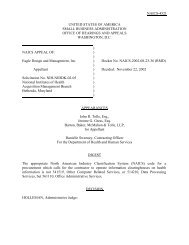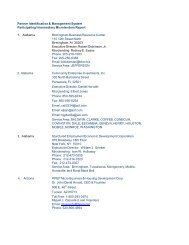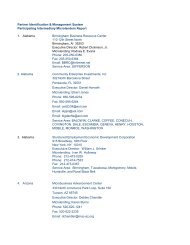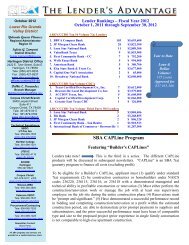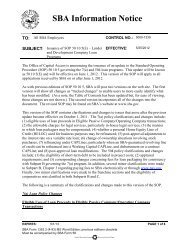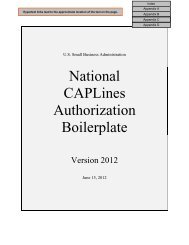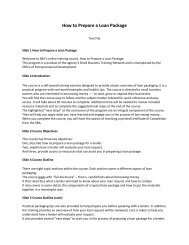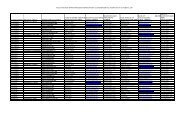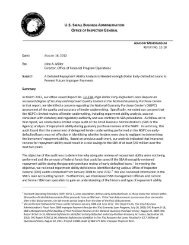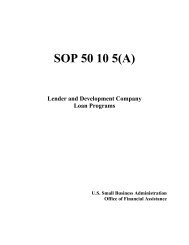Oklahoma Small Business Resource Guide - SBA
Oklahoma Small Business Resource Guide - SBA
Oklahoma Small Business Resource Guide - SBA
You also want an ePaper? Increase the reach of your titles
YUMPU automatically turns print PDFs into web optimized ePapers that Google loves.
ADDITIONAL RESOURCES<br />
Taking care of start up logistics<br />
Even if you are running a<br />
small home-based business,<br />
you will have to comply with<br />
many of the local, state, and<br />
federal regulations. Avoid<br />
the temptation to ignore regulatory<br />
details. Doing so may avert some red<br />
tape in the short term, but could be<br />
an obstacle as your business grows.<br />
Taking the time to research the<br />
applicable regulations is as important<br />
as knowing your market. Bear in mind<br />
that regulations vary by industry. If<br />
you’re in the food-service business,<br />
for example, you will have to deal<br />
with the health department. If you<br />
use chemical solvents, you will have<br />
environmental compliances to meet.<br />
Carefully investigate the regulations<br />
that affect your industry. Being<br />
out of compliance could leave you<br />
unprotected legally, lead to expensive<br />
penalties and jeopardize your<br />
business.<br />
BUSINESS LICENSES<br />
There are many types of licenses,<br />
both state and local as well as<br />
professional. Depending on what you<br />
do and where you plan to operate,<br />
your business may be required to<br />
have various state and/or municipal<br />
licenses, certificates or permits.<br />
Licenses are typically administered<br />
by a variety of state and local<br />
departments. Consult your state or<br />
local government for assistance.<br />
FICTITIOUS BUSINESS NAME<br />
Registering your business name,<br />
after doing a search to make sure that<br />
it is not already in use, protects you<br />
from others who might want to use<br />
the same name. For more information,<br />
contact the county clerk’s office in the<br />
county where your business is based.<br />
If you are a corporation, you’ll need to<br />
check with the state.<br />
BUSINESS INSURANCE<br />
Like home insurance, business<br />
insurance protects your business<br />
against fire, theft and other losses.<br />
Contact your insurance agent or<br />
broker. It is prudent for any business<br />
to purchase a number of basic types of<br />
insurance. Some types of coverage are<br />
required by law, other simply make<br />
good business sense. The types of<br />
insurance listed below are among the<br />
most commonly used and are merely a<br />
starting point for evaluating the needs<br />
of your business.<br />
Liability Insurance – <strong>Business</strong>es<br />
may incur various forms of liability<br />
in conducting their normal activities.<br />
One of the most common types is<br />
product liability, which may be<br />
incurred when a customer suffers<br />
harm from using the business product.<br />
There are many other types of<br />
liability, which are frequently related<br />
to specific industries. Liability law<br />
is constantly changing. An analysis<br />
of your liability insurance needs by<br />
a competent professional is vital<br />
in determining an adequate and<br />
appropriate level of protection for your<br />
business.<br />
Property – There are many different<br />
types of property insurance and levels<br />
of coverage available. It is important<br />
to determine the property you need<br />
to insure for the continuation of your<br />
business and the level of insurance<br />
you need to replace or rebuild. You<br />
must also understand the terms of the<br />
insurance, including any limitations or<br />
waivers of coverage.<br />
<strong>Business</strong> Interruption – While<br />
property insurance may pay enough<br />
to replace damaged or destroyed<br />
equipment or buildings, how will you<br />
pay costs such as taxes, utilities and<br />
other continuing expenses during the<br />
period between when the damage<br />
occurs and when the property is<br />
replaced? <strong>Business</strong> Interruption (or<br />
“business income”) insurance can<br />
provide sufficient funds to pay your<br />
fixed expenses during a period of time<br />
when your business is not operational.<br />
“Key Man” – If you (and/or any<br />
other individual) are so critical to<br />
the operation of your business that it<br />
cannot continue in the event of your<br />
illness or death, you should consider<br />
“key man” insurance. This type of<br />
policy is frequently required by banks<br />
or government loan programs. It also<br />
can be used to provide continuity<br />
in operations during a period of<br />
ownership transition caused by the<br />
death, incapacitation or absence due<br />
to a Title 10 military activation of an<br />
owner or other “key” employee.<br />
Automobile – It is obvious that<br />
a vehicle owned by your business<br />
should be insured for both liability<br />
and replacement purposes. What is<br />
less obvious is that you may need<br />
special insurance (called “non-owned<br />
automobile coverage”) if you use your<br />
personal vehicle on company business.<br />
This policy covers the business’<br />
liability for any damage which may<br />
result for such usage.<br />
Officer and Director – Under most<br />
state laws, officers and directors of a<br />
corporation may become personally<br />
liable for their actions on behalf of the<br />
company. This type of policy covers<br />
this liability.<br />
Home Office – If you are<br />
establishing an office in your home,<br />
it is a good idea to contact your<br />
homeowners’ insurance company to<br />
update your policy to include coverage<br />
for office equipment. This coverage<br />
is not automatically included in a<br />
standard homeowner’s policy.<br />
TAXES<br />
Taxes are an important and complex<br />
aspect of owning and operating a<br />
successful business. Your accountant,<br />
payroll person, or tax advisor may be<br />
very knowledgeable, but there are still<br />
many facets of tax law that you should<br />
Visit us online: www.sba.gov/ok OKLAHOMA <strong>Small</strong> <strong>Business</strong> <strong>Resource</strong> — 39<br />
ADDITIONAL RESOURCES


